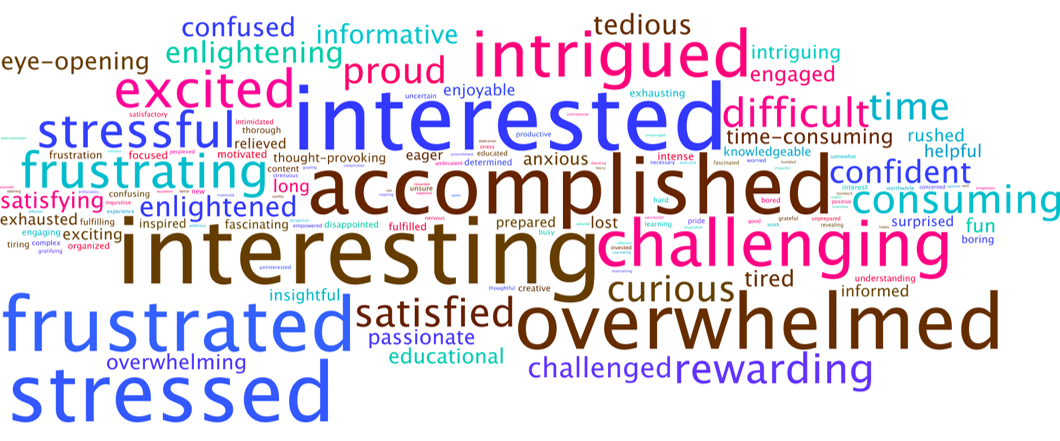It’s totally a real thing that librarians research: students and “library anxiety.”
In the 1970s and 1980s, students used the terms “phobia,” “nightmare,” “dread,” and feeling like “a lost child” or a “knucklehead” when describing how library research made them feel (Mellon, 1986).
In the 1990s, we see the development of an instrument called the Library Anxiety Scale, and scholars determine that “barriers with staff” and “affective barriers” are two of the five key factors in library anxiety (Bostick, 1992; Jiao and Onwuegbuzie, 1997). Basically that means students are anxious about using the library because they think that (a) librarians are intimidating and unapproachable and kind of mean plus we seem too busy to help them, and (b) students think they are the only ones who are are too dumb to use the library and feel like everyone else knows how to do everything so they must really be a knucklehead.
In the late-90s and early 2000s, librarians started writing more about at-risk students, students at non-U.S. universities, perfectionism and library anxiety, plain old anxiety and library anxiety, and information technology and its effect on the library-anxious student.
To me, the most compelling article on this topic centers on shame and library anxiety (McAfee, 2018). McAfee uses scholarship in social psychology to explore how, when evaluated through the lens of shame, a student’s perfectionism and/or procrastination both make a lot of sense; they are both “self-protective measures against the prospect of negative evaluation” (see Fee and Tangney, 2000). The shame state of library anxiety exists because students feel that library staff are “other,” and that the student is doing something wrong by asking questions, by not knowing, and by simply being present in a library space (physical space, such as the building or the front desk, or digital space, such as the website or a database). Library staff can exacerbate the shame state by misunderstanding or not acknowledging the student’s reaction to feeling alienation from the library.
The librarians at Coates Library are aware of this hurdle in our work of making students feel connected, seen, and understood in library and research spaces. We practice attunement strategies to bridge the distance many students experience. McAfee defines attunement as “the opposite of shame; it is a genuine understanding for another person’s position without judgment. It brings security in a relationship, while shame weakens and separates.” She continues,
When a user approaches a librarian with a sincere, awkward apology before asking his question, an attuned response would identify the user’s shame as logical, given his situation. Attunement would also include identifying one’s own shame response as normal (such as a strong urge to correct the student or to ignore the awkwardness). One way to respond is to say, “You came to the right place and you are asking all the right questions.” If a student’s shame causes him to apologize for wasting a librarian’s time, as in, “I am so sorry to bother you…,” an attuned response might be, “I am so glad you came to me with your question, because helping library users like you is the best part of my day.” “Best” could be interchanged with “interesting,” “rewarding,” or any term that lets the student know his library needs are important to the librarian. (McAfee, 2018)
So why do you, a new Trinity faculty member, need to know about library anxiety?
Because you can help.
Having a librarian teach an information literacy session, or even drop by to introduce themselves, has been shown to allay students’ anxiety (Blecher-Cohen, 2019; Wildemuth, 2017). Seeing the librarian as a resource and not an “other” can go a long way, whether we visit your classroom or meet students over Zoom.
You probably overcame your own library anxiety years ago, or maybe you never even experienced it, even as an undergrad. When you tell a student to “go talk to a librarian” or ask them “why didn’t you use the library?”, you may not realize how much anxiety students feel about asking questions about research, information, and the library. We expect students to exhibit even higher levels of general anxiety this semester because of the global pandemic.
TL;DR: Please remind your students that we are here to help. We want to alleviate students’ library anxiety.
References:
Blecher-Cohen, Z. (2019). The student connection: Thinking critically on library anxiety and information literacy. Public Services Quarterly, 15(4), 359-367.
Bostick, S. L. (1992). The development and validation of the Library Anxiety Scale (Doctoral dissertation). Wayne State University. 176p.
Fee, R. L. & Tangney, J. P. (2000). Procrastination: A means of avoiding shame or guilt?. Journal of Social Behavior and Personality, 15(5), 167. https://search-ebscohost-com.libproxy.trinity.edu/login.aspx?direct=true&db=s3h&AN=10637208&site=ehost-live
Jameson, J., Natal, G., & Napp, J. (2019). Evolving and enduring patterns surrounding student usage and perceptions of academic library reference services. College & Research Libraries, 80(3), 366. https://crl.acrl.org/index.php/crl/article/view/17116
Jiao, Q. G., & Onwuegbuzie, A. J. (1997). Antecedents of library anxiety. The Library Quarterly, 67(4), 372-389. https://libproxy.trinity.edu/login?qurl=https://www.jstor.org/stable/40039590
McAfee, E. L. (2018). Shame: The emotional basis for library anxiety. College & Research Libraries 79(2), 160-165. Retrieved from https://crl.acrl.org/index.php/crl/article/view/16604/18604
Mellon, C. A. (1986). Library anxiety: A grounded theory and its development. College & Research Libraries 47(2), 160-165. Retrieved from https://crl.acrl.org/index.php/crl/article/viewFile/14195/15641
Onwuegbuzie, A. J., & Jiao, Q. G. (2000). I’ll go to the library later: The relationship between academic procrastination and library anxiety. College & Research Libraries, 61(1), 45-54. https://crl.acrl.org/index.php/crl/article/viewFile/15341/16787
Wildemuth, B. (2017). Library anxiety impedes college students’ library use, but may be alleviated through improved bibliographic instruction. Evidence Based Library and Information Practice, 12(4), 275-280. https://journals.library.ualberta.ca/eblip/index.php/EBLIP/article/view/29352

